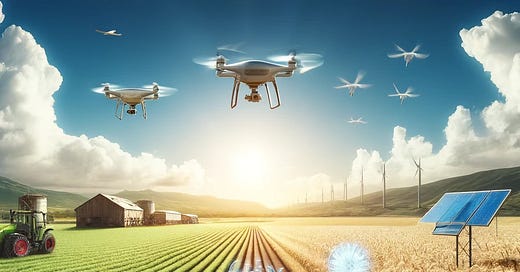Soil serves as the foundation of agriculture, akin to the ancient roots of a towering tree, cradling tomorrow’s harvests within its rich, earthy tapestry. This fertile ground not only nurtures life and growth but also underpins the global food supply, making its stewardship a cornerstone of sustainable practices. As climate resilience becomes as critical as the air we breathe, the health of our soil is paramount, influencing everything from food security to water purification and acting as a vital carbon sink. As we move into 2024, a vanguard of ClimateTech companies is emerging, wielding innovative tools and technologies designed to nurture and protect this invaluable resource. By optimizing soil management and embracing data-driven agriculture, these pioneers are not merely cultivating crops; they are planting the seeds of a future where farming exists in harmony with nature, ensuring a greener, more resilient world for generations to come. This exploration embarks on a journey through the initiatives of these companies, illuminating their revolutionary contributions to the agricultural landscape.
The Environmental Impact of Agriculture on Climate Change
Agriculture holds a dual role in its relationship with the environment, offering sustenance while posing significant challenges to our climate. It contributes approximately 24% of global greenhouse gas emissions, highlighting the sector's profound impact on global warming. Methane, emitted predominantly through livestock's enteric fermentation, represents about 40% of these emissions, with a warming potential 25 times greater than CO2 over a century. Furthermore, the use of synthetic fertilizers releases nitrous oxide, a gas nearly 300 times more potent than CO2, accounting for 60% of its global emissions.
Water use in agriculture also poses a substantial challenge, consuming about 70% of the world’s freshwater reserves. This massive demand leads to water scarcity and contributes to the depletion of aquifers at rates far surpassing their natural replenishment. Additionally, soil degradation—resulting from erosion, compaction, salinization, and chemical pollution—has already rendered 33% of Earth's soils moderately to highly degraded.
The convergence of these factors—greenhouse gas emissions, excessive water use, and land degradation—underscores the urgent need for sustainable agricultural practices. The imperative to adopt innovative solutions is critical, not only to mitigate agriculture’s environmental footprint but also to fortify food systems against the impacts of a changing climate.
Leading the Charge: ClimateTech Innovations in Agriculture
As the agricultural sector faces the imperative to produce more with less, a new breed of ClimateTech companies is rising, each harnessing innovative technologies to revolutionize farming practices. These pioneers are not just responding to climate challenges; they are reshaping the future of agriculture.
AgroAI At the forefront of agricultural innovation, AgroAI utilizes advanced artificial intelligence for detailed soil analysis and crop monitoring. This technology enables farmers to make informed, data-driven decisions that optimize resource usage, significantly boosting efficiency. In the Midwest, USA, AgroAI's methods have led to a remarkable 30% reduction in water usage on partner farms, exemplifying the potential of AI to foster more sustainable agricultural practices.
GreenHarvest Technologies GreenHarvest Technologies is pioneering the development of bioengineered seeds that are tailored for drought resistance. These seeds have become a lifeline in the arid regions of Sub-Saharan Africa, where they have successfully tripled crop yields. This breakthrough addresses the critical need for drought-resilient crops and bolsters food security in some of the world’s most vulnerable regions.
SolarFarms Embracing renewable energy, SolarFarms has introduced solar-powered irrigation systems, a major innovation in sustainable farming. Implemented in over 500 farms, these systems reduce the carbon footprint of agricultural operations by 40%, showcasing a scalable model for integrating clean energy into agriculture.
HydroVert HydroVert is transforming urban agriculture with its advanced vertical farming technologies. By cultivating crops in vertically stacked layers, HydroVert’s systems utilize 90% less water than traditional farming methods and increase yields by 20%. This efficient use of space and resources presents a practical solution for sustainable food production in urban areas, where space is at a premium.
EcoDrones Specializing in precision agriculture and reforestation, EcoDrones leverages drone technology to enhance agricultural productivity and environmental sustainability. These drones have not only planted over 1 million trees but also provided essential data for crop monitoring, improving yields and demonstrating a scalable approach to reforestation and precision farming.
As we delve deeper into the intersection of technology and sustainable agriculture, these ClimateTech companies illustrate a powerful commitment to innovation and environmental stewardship. Their efforts are vital in paving the way toward a more sustainable agricultural sector that aligns with the ecological needs of our planet. By fostering a symbiotic relationship between technology and traditional farming practices, they are ensuring a sustainable, prosperous future for global agriculture, securing a healthier planet for future generations.




